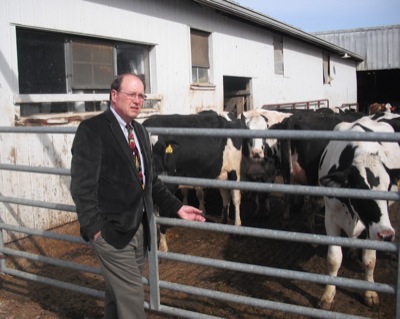Friday, April 5th, 2013
New manure, fertilizer rules in the works
Proposed legislation would require certification to apply nutrients
By Nancy Allen

Photo by Nancy Allen/The Daily Standard
Ohio Department of Agriculture Director David Daniels tours Brownhaven Dairy in Auglaize County on Thursday after speaking at a monthly ag breakfast meeting in Celina about proposed legislation that would require certification for people who apply manure or manmade commercial fertilizer.
Proposed legislation would create new statewide regulations for those who apply manure and manmade commercial fertilizers to farmland.
Officials previously said the rules, expected to be introduced in the state legislature this year, would apply only to manmade fertilizers.
"All nutrients would be part of the legislation, fertilizer and manure," said ODA Director David Daniels at Thursday's monthly Mercer County agriculture breakfast meeting in Celina.
The draft legislation says anyone who applies manure or manmade fertilizer for agricultural production would be required to obtain certification from the ODA; a person could apply nutrients without a certification as long as he or she is directly supervised by a person who is certified.
The rules would affect anyone with 10 acres or more of agricultural production land. The certification would be required of applicators within three years of the legislation becoming law.
"People applying nutrients would have to get certified much like they do for pesticide certification," Daniels said. "This will get them to learn the 4 Rs."
The 4 Rs of nutrient stewardship tells farmers to use the right type of fertilizer at the right rate at the right time and in the right place.
ODA spokeswoman Erica Pitchford Hawkins could not estimate how many Ohio farmers would need certified.
"A lot of them," she said. "Currently we do 40,000 pesticide certification licenses that need renewed every three years; we anticipate way more (of the manure and manmade fertilizer applications).
There are about 1,300 farms in Mercer County, based on the USDA ag census.
Most farmers in the county use manure on their cropland.
"Anyone who owns livestock is going to have to get it and anyone who has more than 10 acres is too," said Mercer County Soil and Water Conservation District Engineer Theresa Dirksen.
Dirksen said it's too early to tell whether the nutrient certification is a good thing.
"The actual rules have not been written and until those rules are written, you cannot assess the effectiveness of the program," Dirksen said.
Dirksen said many farmers likely are not aware of the proposal. She just learned of some of the details about a week ago.
Certification courses likely would be offered by OSU Extension, which would contract with the ODA to provide the service, Pitchford Hawkins said.
The proposed legislation also would require anyone who manufactures or distributes manmade commercial fertilizer for agriculture production to get a license from the ODA, which will enable the state to track sales of commercial fertilizer.
Manmade, commercial fertilizers contain dissolved phosphorous, the type blamed for contributing most to toxic blue-green algae blooms in Lake Erie.
Also during Thursday's breakfast meeting, Daniels said the ODA's main mission is plant and animal health and food safety. The agency employs various inspectors who visit meat and egg processing plants and farms around the state.
"Inspectors have a regulatory function and we want to make sure they are a welcome guest, not an invasive pest," Daniels said. "We want to help people operate and remain viable and continue to employ the people they do."
Agriculture contributes $107 billion a year to the state's economy and accounts for one in seven jobs, he said.
New this year, Ohio has an agreement with the USDA that allows meat processors to sell meat outside the state. The ODA has been trying for 20 years to get this designation, Daniels said.
"A guy from Lorain (Ohio) said this designation would triple his business," Daniels added.
Daniels touted the ODA's nationally-certified labs and said other states are reaching out to the ODA because they know the research done at the labs is "top flight." A state easement program also is protecting farmland from development, he said.
Following the breakfast meeting, Daniels and a contingent of local and state ag officials and politicians toured the Cooper Farms turkey processing plant in St. Henry. They viewed the evisceration, deboning and areas where the meat is further processed into burgers and roasts. The group then stopped at Brownhaven Dairy in Auglaize County where they heard from Lou Brown on the many conservation practices he has installed on his dairy farm, including filter strips, no-till and winter cover crops.
The next monthly agriculture breakfast meeting is 7:30 a.m. May 2 at the Mercer County Central Services Building in Celina.


